Five takeaways from Biden's White House cabinet

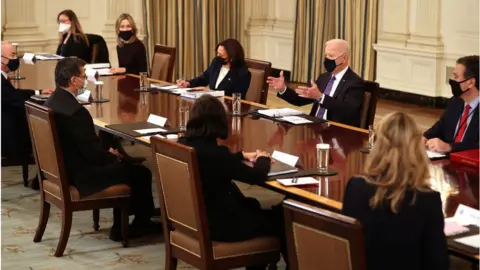 Getty Images
Getty ImagesIt's been a long three months, but US President Joe Biden has now finalised his White House cabinet - the top aides that will guide his administration's oversight of the federal government. On Thursday, the president sat down for the first time with his assembled team.
With Labour Secretary Marty Walsh's Senate confirmation last week, Biden filled all 15 of his presidential cabinet secretary positions.
The confirmation process began slowly, with delays in appointees being named and Senate confirmation hearings conducted in part because of drawn-out Republican challenges to Biden's presidential victory and Donald Trump's impeachment trial.
By roughly the 60-day mark of his presidency, however, Biden has caught up with most of his recent predecessors in having his department heads installed in office. He is also the first president since Ronald Reagan in 1981 to have all his original cabinet nominees successfully confirmed.
Here's a look at five key takeaways from the process.

A diverse team - with an exception
Of Biden's 15 cabinet secretary picks, only five are straight, white men. That's the lowest percentage of any presidency. (Donald Trump, by contrast, had 11; Bill Clinton, the previous record-holder, had six out of 14.)
Biden's cabinet has a number of firsts, as well. Janet Yellen is the first woman Treasury secretary. Interior Secretary Deb Haaland is the first Native American woman to lead a department.
Pete Buttigieg became the first openly LGBT cabinet secretary. Secretary of Defense Lloyd Austin is the first black person to head the Pentagon. Xavier Becerra and Alejandro Mayorkas are the first Hispanic chiefs of Health and Human Services and Homeland Security, respectively.
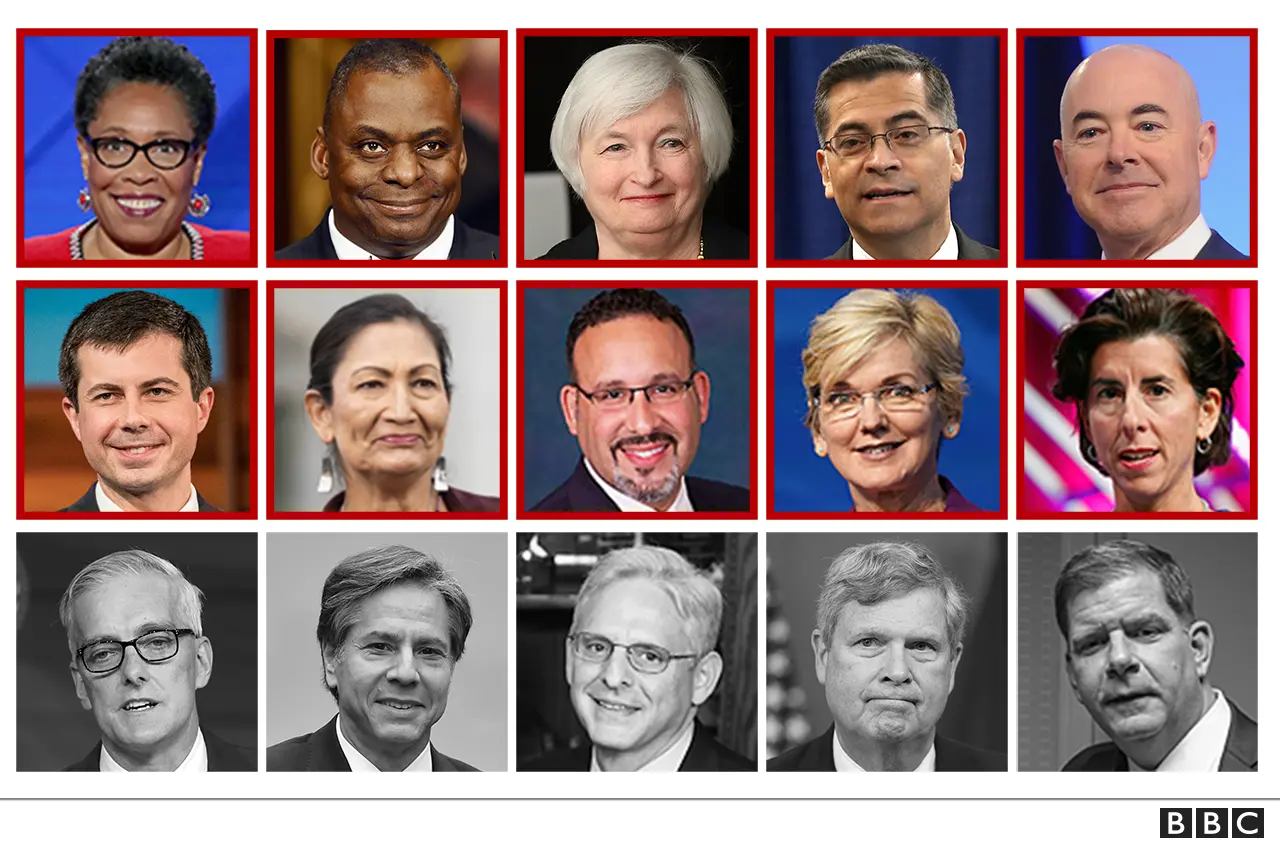
The graphic above shows all of Mr Biden's nominees - those with black and white photos are white men, while those with colour photographs are in one or more of these categories: women; people belonging to ethnic minorities; member of the LGBT community.
One absence from Biden's top cabinet appointments is anyone of Asian American or Pacific islander (AAPI) heritage - the first such omission in 21 years. It's a development that has generated a critical reaction from some Democrats, even though Vice-President Kamala Harris is of South Asian descent.
"To be told that, 'Well, you have Kamala Harris - we're very proud of her; you don't need anybody else' is insulting," said Illinois Senator Tammy Duckworth.
Asian Pacific American Institute for Congressional Studies President Madalene Xuan-Trang Mielke warned in a January statement that Biden risked alienating the fastest growing racial or ethnic group in the US electorate.
In the 2020 presidential election, 11 million Americans of AAPI descent cast ballots, supporting Biden over Trump by a two-to-one margin according to exit polling.
"The brazen exclusion of AAPIs in this incoming administration abandons and erases the AAPI community," she said.
Narrow victories
The average margin of victory for Biden's nominees in the Senate was 48 votes - a comfortable, bipartisan majority.
Only two cabinet secretary nominees faced serious tests in the chamber - Interior Secretary Haaland and Health and Human Services Secretary Becerra.
Haaland, a former congresswoman from New Mexico, received staunch opposition over her past views on energy policy.
During confirmation hearings, she was repeatedly pressed on her opposition to oil shale "fracking" on public lands as well as her past support for the "Green New Deal" plan to address climate change.
In the end, only four Republicans voted for confirmation.
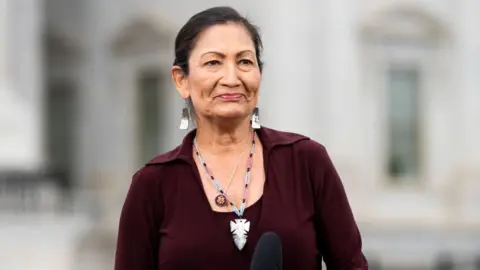 Getty Images
Getty ImagesBecerra, a former member of Congress and attorney general of California, had the closest vote of any Biden appointee - 50 to 49. Anti-abortion groups dug in against the nominee for his past support for legal cases defending abortion rights and regulating conservative "pregnancy counselling" centres.
Becerra also faced opposition for his outspoken defence of Democratic-passed healthcare reforms and support for the rights of undocumented migrants.
Although Republicans criticised Becerra's relative lack of health-policy experience, that hadn't been much of a consideration in past health secretary nominees.
Rather, both confirmations indicate that hot-button political issues like abortion, immigration and environmental regulation can continue to move votes within the Republican Party - something the Biden team will have to keep in mind in the policy battles to come.
That these nominees were people belonging to ethnic minorities was also duly noted by some liberals.
"There seems to be a pattern here," Democratic Senator Mazie Hirono of Hawaii told Politico.
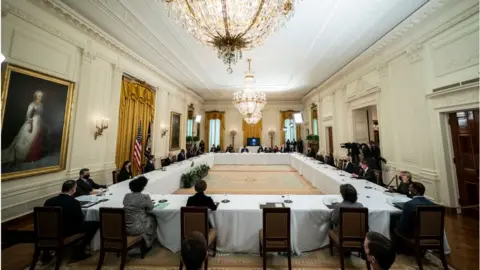 Getty Images
Getty ImagesA Neera Miss
Although all of Biden's department secretaries were confirmed, he didn't post a clean sheet when it came to cabinet-level appointments.
Neera Tanden, chosen to head of the White House budget office, was the only nominee Biden had to withdraw in the face of a losing confirmation vote.
Back before Democrats swept the two Georgia runoff elections and it appeared that Republicans were going to maintain control of the US Senate, Tanden was considered by some to be a sacrificial lamb of sorts - a more controversial nominee that Republicans could vote down, proving to their base they were opposing the Biden administration without jeopardising any of Biden's higher-level picks.
With Democrats in control, it seemed for a time that Tanden - a longtime Democratic operative with close ties to former Democratic presidential nominee Hillary Clinton - might squeak through.
She didn't.
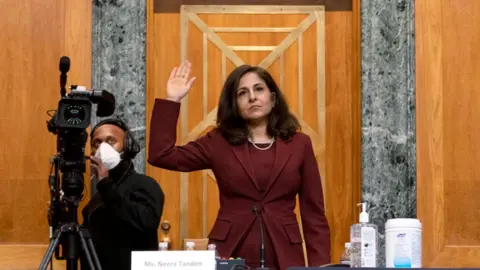 Getty Images
Getty ImagesThe proximate cause of Tanden's political demise was her history of inflammatory tweets directed at her political opponents on the progressive left and the right. It didn't help that she focused her online ire at some moderate Republican senators by name, including Susan Collins and Lisa Murkowski, who might otherwise have been cajoled into supporting her. When moderate Democrat Joe Manchin of West Virginia and those in-play Republicans came out against confirmation, her fate was sealed.
The larger lesson from the Tanden affair is that political moderates are going to hold Biden to his "new tone" rhetoric when it comes to administration staff.
Tanden's defenders were quick to identify Trump-era appointees who were even more confrontational on social media (not to mention the Trump himself), but - for centrist senators, at least - the "what about" defence didn't fly.
"Neera Tanden has neither the experience nor the temperament to lead this critical agency," Collins wrote in a statement announcing her opposition to Tanden. "Her past actions have demonstrated exactly the kind of animosity that President Biden has pledged to transcend."
The Republican "no" brigade - and "yes" contingent
Over the course of 15 votes on Biden's cabinet choices, clear patterns began to emerge about who in the Senate will vehemently oppose the new administration and who might be open to outreach.
At the top of the former list is Missouri's Josh Hawley, who voted against every one of Biden's top appointments. He's positioned himself as the hardest of hard-liners against the president, having also led the push to challenge Biden's election certification in Congress just hours after the Capitol was stormed by pro-Trump rioters.
Just behind Hawley in lockstep opposition are Ted Cruz of Texas and Rick Scott of Florida - both of whom only voted for Defence Secretary Austin. Both, like Hawley, are also eyeing 2024 White House bids.
Presidential ambitions, in fact, seem to be the best predictor of whether a Republican senator would vote against a Biden nominee, suggesting a political calculation that any co-operation with the new administration will be political poison in 2024 Republican presidential primaries.
On the flip side, the group of Republicans most likely to cross the aisle to vote with Democrats has also revealed itself - although their identities shouldn't be much of a surprise.
 Getty Images
Getty ImagesCollins of Maine supported all of Biden's nominees. Murkowski did for every one except Becerra. They, and Mitt Romney of Utah (with 13 "yes" votes), also backed Trump's impeachment conviction in February and are clearly beyond worrying about angering their party's base.
A number of other moderates (Rob Portman of Ohio, Shelley Moore Capito of West Virginia and Dan Sullivan of Alaska) and old Senate hands (Minority Leader Mitch McConnell and Chuck Grassley of Iowa) also approved a double-digit number of Biden picks.
If the Biden is going to cobble together any kind of bipartisan coalition to support his legislative agenda, that former group might be a good place to start.
Just the beginning
Rod Rosenstein wasn't exactly a household name when Donald Trump nominated him to be deputy attorney general - but that changed quickly when Rosenstein, acting in place of recused attorney general Jeff Sessions, appointed Robert Mueller as special counsel to investigate Russia's alleged 2016 election meddling.
Biden still has to fill out much of his administration with the people who do the actual work in the various government departments and agencies.
Although the public may not be paying attention, politicians are. On Monday, Biden pulled the nomination of Elizabeth Klein - a liberal law professor and climate activist - to be deputy interior secretary because of objections from Republican Senator Murkowski.
Democratic Senator Duckworth threatened to block all straight, white male Biden nominees unless Asian-Pacific-Islanders were given more appointments.
Political skirmishes like these fly below the public's radar, but they can go a long way toward setting the tone for relations between the executive and legislative branches of the US government even when, as today, one party controls both.
These lower-level appointments can also be cause for celebration among various constituencies within the Democratic Party, such as when Assistant Secretary for Health Rachel Levine recently became the first openly transgender federal official to be confirmed by the US Senate.
The Washington Post is tracking 790 Senate-confirmed executive positions. Of those, only 29 have been confirmed, 37 are awaiting a vote and 458 have yet to be filled. There will be plenty of other opportunities for history - and controversy - in the days ahead.
